Hello there! Welcome to The Magpie, a newsletter that serves as a collection of shiny objects about writing, creativity, hopes, and obsessions. My current obsession is diaries and the people who write them. Since I started keeping one at age eight, my diary has been a place of exploration and intensity, of lists and favorite quotes, of ticket stubs and wildflowers. It is a place to remember and a place to dream.
My most recent book, The Leaving Season: A Memoir in Essays, is out now! I relied on decades of my own diaries to help me write this book. My next book focuses on historical diaries of women, famous and not, and why we continue to write—and read!—these archives.
This is a Show Me Your Diary interview, a series that explores diaries and the creatives who keep them. Every week, I ask a new person to give us a peek inside their diary process, complete with photos. Yes, we are very nosy!
Want to show me your diary, or know somebody who does? Send me an email—you can just reply to this newsletter. Let’s get started…
Today’s interview is with Olga Katsovskiy, a writer, editor, and teacher based on the Boston area who focusses on creative nonfiction and journaling. I first met Olga at the Boston Book Festival last year at one of my panels called Desire: The Promise and Price of Wanting. During the beautiful conversation with
, Fancy Feast, and Lydia Moland about how desire shapes us and at what cost, we got to talking about writer’s block (and how I don’t go in for this concept). I probably said something about how journaling is the kryptonite of writer’s block, and Olga came up to me afterwards to continue the conversation.I quickly learned that Olga was part of the Journal Girl club (a term I love and just heard this week from fellow journaler
). In fact, Olga had thought deeply about diaries in an academic way and teaches a class called How to Keep a Journal Like a Writer (see Events & Classes below—a new session starts soon!). We connected over our love of diaries and a few weeks later Olga wrote about the link between diaries and writer’s block in an essay for Brevity Mag. (In response to one of her prompts, my favorite favorite responded: And anyone over the age of seventy could open one of those old blue jars of Noxzema, and suddenly be sixteen, feeling whatever she felt at that beautiful terrible age. YES!)I was excited when Olga agreed to be interviewed for this space because I knew I’d have much to learn from our conversation—she is such a deliberate thinker and I had a feeling this would translate into her journal-keeping. It made sense to me that this quote from Anaïs Nin is one of her favorites: “We do not grow absolutely, chronologically. We grow sometimes in one dimension, and not in another; unevenly. We grow partially. We are relative. We are mature in one realm, childish in another. The past, present, and future mingle and pull us backward, forward, or fix us in the present. We are made up of layers, cells, constellations.” This is from The Diary of Anaïs Nin, Volume 4 (1944-1947), another diarist who numbered her journals, as Olga does (read more below!).
For the Show Me Your Diary interview, we talked about journaling to calm the chaos in one’s mind, Olga’s habit of creating a TOC for each journal after she completes them, and why she believes that writer’s block “is usually a symptom of living in denial.”
And, of course, she lets us peek inside some of her actual diaries!
THE MAGPIE: Team Diary vs Team Journal? What do you like to call it?
OLGA KATSOVSKIY: I have used diary and journal interchangeably but lean towards journal. I’ve always thought diaries are for recording our day-to-day life in chronological order while journals are more chaotic and inward facing. I went through a period of adolescence when I felt I had to write down everything, which was a source of endless frustration because I could never keep up. Stephanie Niu describes this same childhood obsession in the essay Manufacturing Ghosts: On Making Images of the World While Being In the World.
How long have you kept a diary?
Figuring things out on paper always felt essential. I remember scribbling and drawing before I started writing as a child. I used to tape dried-up markers inside my notebooks, wanting to document their scent because I couldn’t find the words. I started keeping a more formal diary around age 10, a thin spiral bound lined notebook with a fluffy teddy-bear brown cover. I’m glad I still have it!
Figuring things out on paper always felt essential.
What do you hope will happen to your journals once you are gone?
This question is hard to think about, because I have mixed feelings. I’ve been numbering all my journals and consider them tangible archives of my past selves. It’s horrifying to imagine someone might read them, and even more disturbing that they would be examined out of order. I hope there will be someone in my life who cared about me to hold onto them. Yet I find it comforting knowing that my handwriting would be mostly illegible. And I hope no one ever finds my journals from college.
What is your favorite kind of diary to use?
The pocket size soft cover Leuchtturm1917 notebooks are my current favorite. I’ve been writing in pocket journals for the last 15 years. I like their portability and usually fill one in about four months. I use both the hard and soft cover versions and lately gravitate towards soft covered notebooks because they have fewer pages, and it feels rewarding to finish one. I have a large stash of this brand notebooks waiting for their turn. The older ones were made in Taiwan and have perfect lay-flat binding and smoother paper. They were also faintly lined or gridded and are pleasant to write on. Unfortunately, most notebook brands nowadays have dark lines.
I ordered a lot of these pocket journals from the Kikkerland online shop years ago and my husband likes to joke that I should have ordered them in bulk. I number each finished notebook on the inside of the front cover (my current one is #36). These notebooks have a Table of Contents in the beginning, which I like to fill in with some moments I’d like to highlight after I finish a journal. I usually just flip through and note down anything I think I’d want to remember years from now and be able to find the page easily.
How has your diary-keeping changed over the years?
The chunkier journals are from the years I used to collage and draw, which I don’t do anymore. I might stick on an occasional sticker or a tea label in my journal, but I just can’t be bothered to play with glue sticks or take time to carefully arrange ephemera. I stopped being preoccupied with aesthetics and use my journals to write. I used to keep separate notebooks for different areas of my life, which I also don’t do anymore. Now my journals serve as commonplace books. The only exception is my designated notebook for notes related to my day job, since it is far from anything literary. But I love seeing my notes from classes alongside my regular journal entries, and random lists of things I want to do or investigate.
I love seeing my notes from classes alongside my regular journal entries, and random lists of things I want to do or investigate.
When do you write in your diary?
I carry my journal with me when I’m out and about. People say the weirdest things on public transportation, and I like to write what I overhear, although I also have a list of Keep notes on my phone when I’m in public and transcribe those in my journal later. I try to write at the end of the day before bedtime. Sometimes I don’t write for days and always feel like something is off when that happens. It’s usually a sign that something needs to change and once I reach that awareness, I get back into writing again. Writer’s block is usually a symptom of living in denial.
Who are you writing to in your diary?
As a child I used to address my entries to a hypothetical “Dear Friend.” Now I rarely think of addressing an entry to anyone, mostly to my past or future selves.
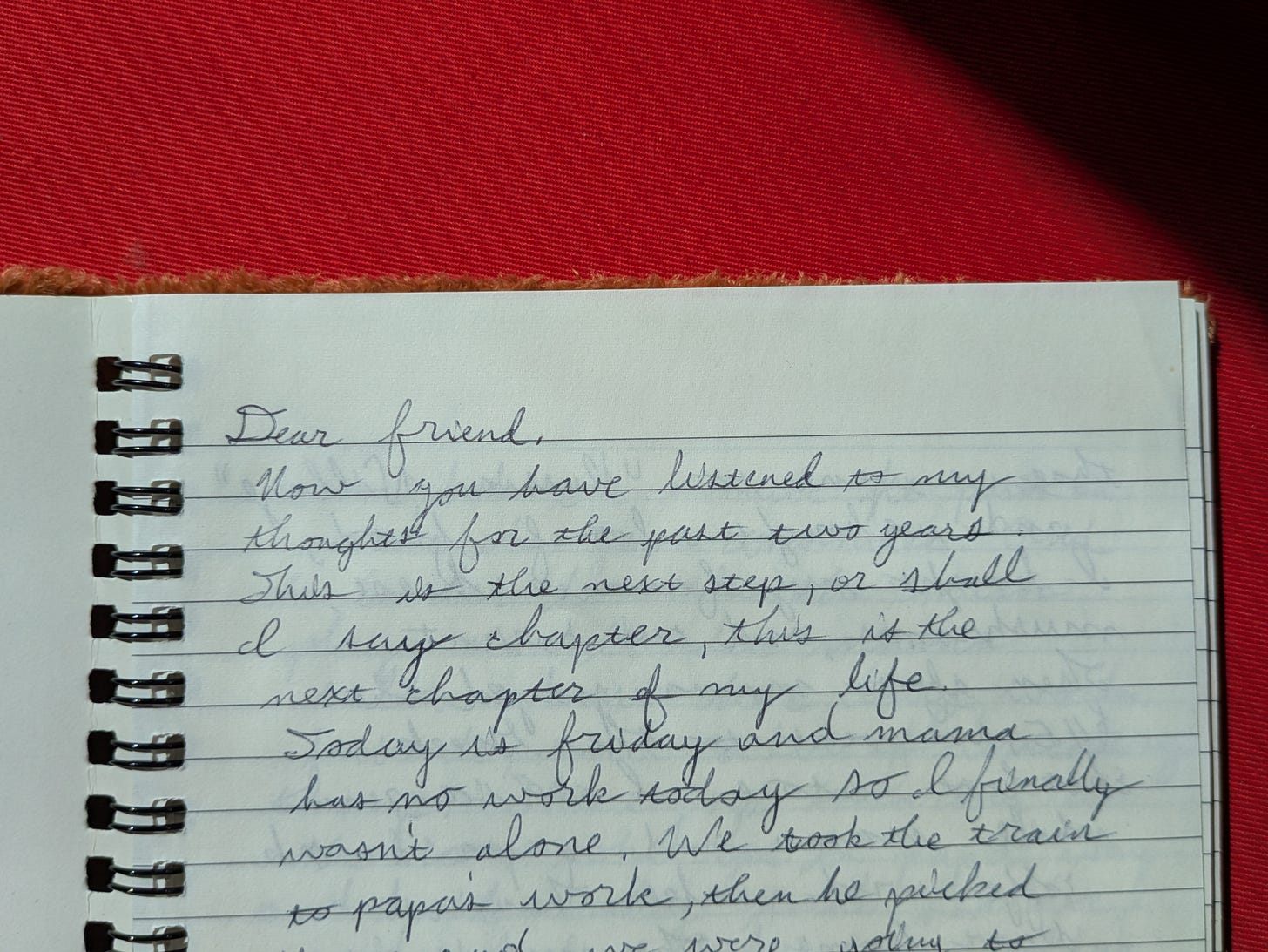
As a writer, how is your voice different in your diary than on the published page?
Since writing nonfiction draws from my real life, I’ve noticed my journaling voice has spilled into my essays. Of course, journal entries are a lot messier and more nonsensical out of context, but they’re also a place where ideas for an essay are germinating.
More About Olga Katsovskiy:
Olga Katsovskiy, writer/editor/educator, works in healthcare by day, and by night, teaches creative non-fiction writing at the Cambridge Center for Adult Education and occasionally at Writers in Progress.
She also volunteers at several literary magazines and drinks a lot of coffee. Her essays have appeared in Atticus Review: The Attic, Barzakh Magazine, Brevity Blog, Pithead Chapel, Short Reads, and elsewhere.
Social media: You can find Olga on Instagram
Upcoming events:
Upcoming Zoom classes with Olga (Eastern Time):
In Short: The Art of Flash Essay Writing: 8 Wednesdays, 7-8:30pm. Begins June 18th
Writers in Progress Community Writing Workshop: Sunday, August 3rd, 9:30am-12:30pm & Sunday, November 2nd, 9:30am-12:30pm
Flash Essay: The Macro in Micro: Saturday, September 6th, 9:30am-12:30pm
How To Keep a Journal Like a Writer: Saturday, October 18th, 9:30am-12:30pm
Writers in Progress Community Writing Workshop: Sunday, November 2nd, 9:30am-12:30pm
Find more on her website: writingincurves.com
Recent pubs:
Fall Is a Garage Sale – Emerge Literary Journal Issue 33/34
Reflections on the AWP Conference: Evidence of Us – Brevity Blog
For more: https://writingincurves.wordpress.com/publications/
And be sure to subscribe to Olga’s free newsletter with reflections on books, writing, and the creative life:
Thanks for reading The Magpie by Kelly McMasters! As always, more of what I’m up to can be found on my website, and you can follow me on Instagram for day-to-day updates.
Buy The Leaving Season here, Welcome to Shirley here, Wanting: Women Writing About Desire here, and This is the Place: Women Writing About Home here.


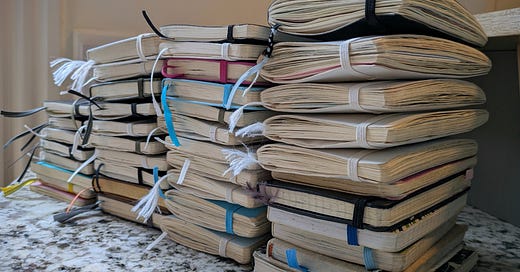



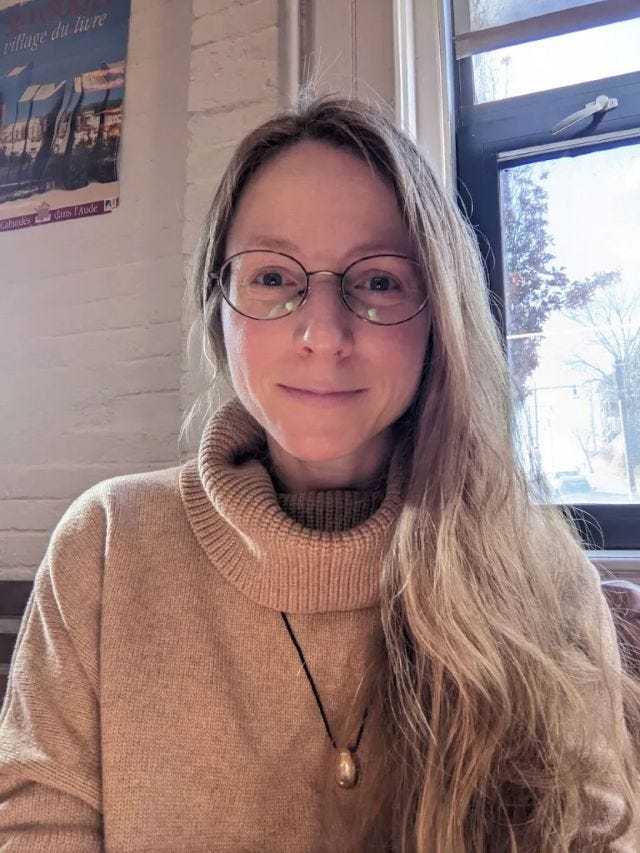

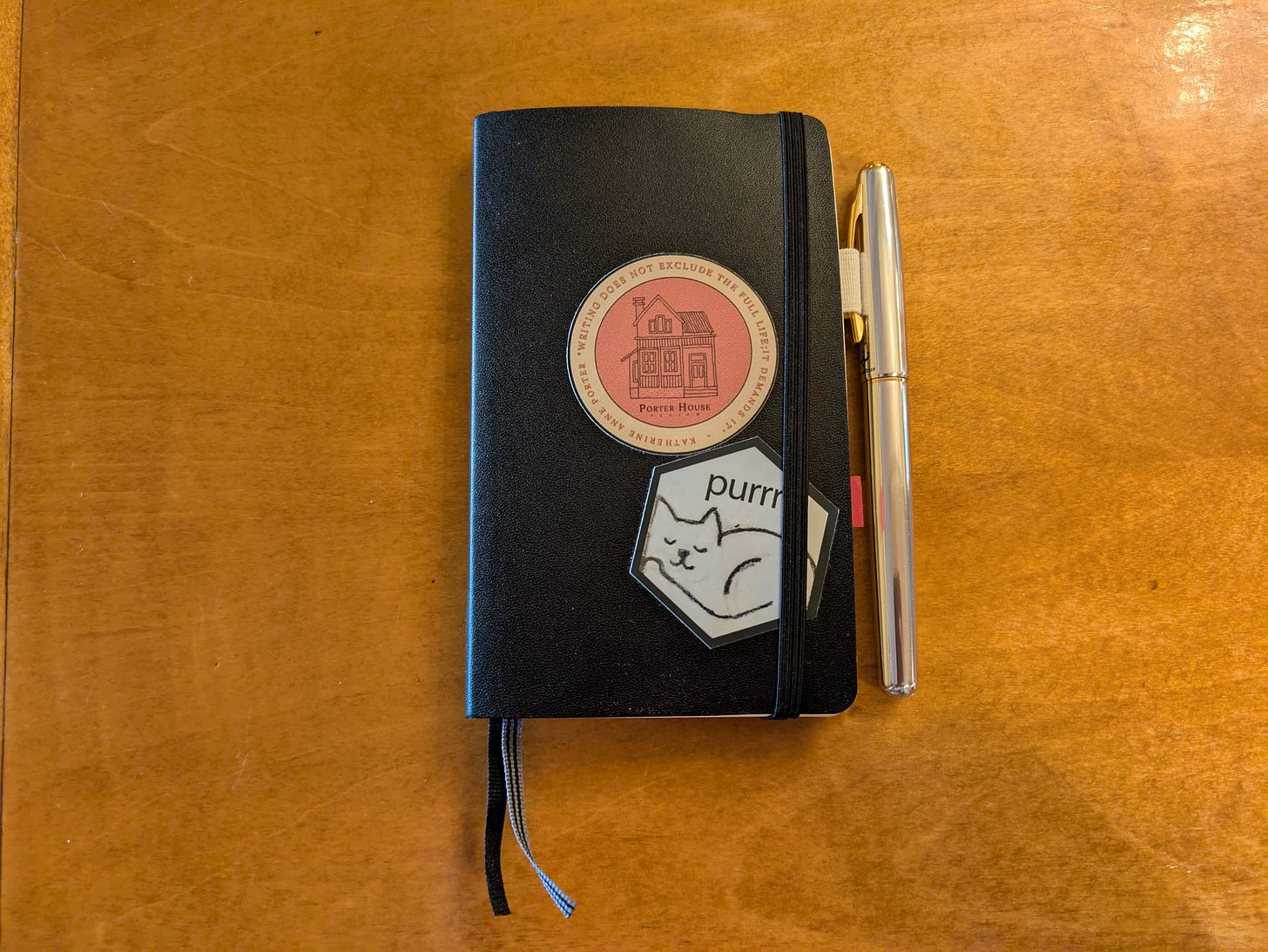
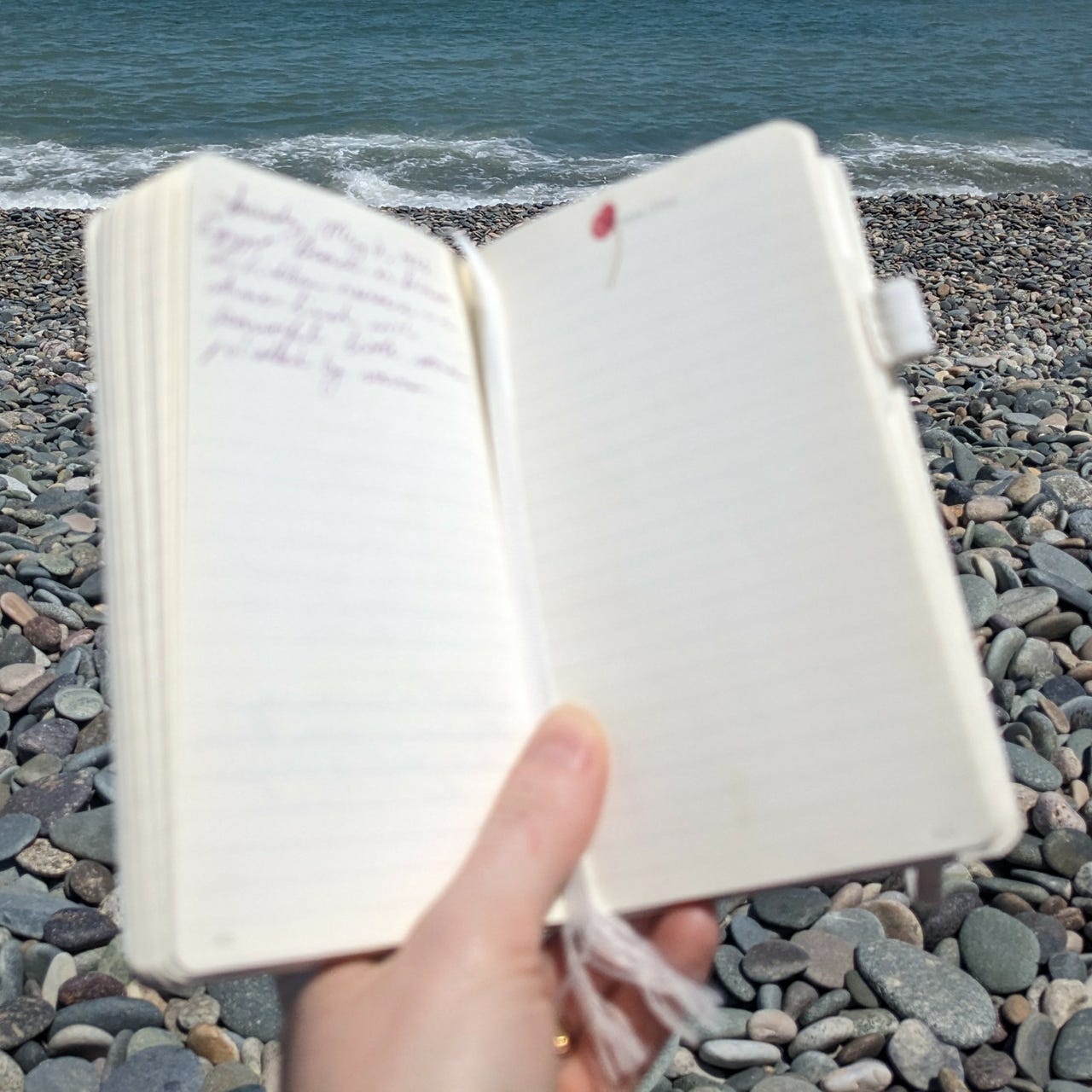


Oh gosh, I aspire to that kind of organization--to be able to keep a TOC and number on the inside. As I get more serious about keeping journals/notebooks, perhaps this is my sign to adopt this practice (my future self will thank me). I really liked this line: "journals are more chaotic and inward facing." That's always how I've viewed mine, too.